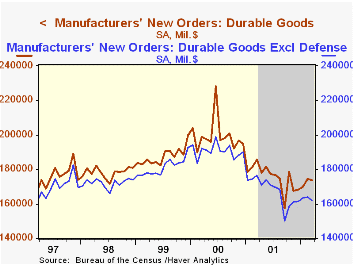 Global| Apr 24 2002
Global| Apr 24 2002Durable Goods Orders Down
by:Tom Moeller
|in:Economy in Brief
Summary
Durable goods orders fell unexpectedly last month following a February gain that was revised up. The report excludes semiconductors because many chip makers declined to supply data. Semiconductors were removed from the January and [...]

Durable goods orders fell unexpectedly last month following a February gain that was revised up.
The report excludes semiconductors because many chip makers declined to supply data. Semiconductors were removed from the January and February figures in order to make comparisons with those months possible. In February, semiconductors accounted for roughly 3 percent of durables orders.
Orders for defense goods surged 17.8% following a 94.2% gain in February. Excluding defense, durable orders fell 1.2% and are down 3.4% since December, but these results exclude semis.
Orders for electrical equipment fell 2.3%, the third sharp decline in four months. Orders for transportation equipment fell 1.6% after higher aircraft orders boosted February 11.2%.
Durable shipments were unchanged after having been down in three of the prior four months.
Durable inventories fell 1.1% and have fallen in each of the last fourteen months.
| NAICS Classification | Mar | Feb | Y/Y | 2001 | 2000 | 1999 |
|---|---|---|---|---|---|---|
| Durable Goods Orders | -0.6% | 2.7% | -6.7% | -12.0% | 6.3% | 5.3% |
| Nondefense Capital Goods | -2.8% | 4.6% | -18.4% | -17.2% | 14.4% | 3.5% |
by Tom Moeller April 24, 2002

Sales of new single family homes fell slightly last month but February sales were revised higher.
Sales of 880,000 were expected.
Sales were down in each of the country’s regions except the West.
The median price of a new home fell 3.4% to $176,700, +6.3% y/y. February was revised up.
The new home sales data reflect current sales versus the existing home sales figure which reflects closings on past sales.
| Homes Sales (000s, AR) | Mar | Feb | Y/Y | 2001 | 2000 | 1999 |
|---|---|---|---|---|---|---|
| New Single-Family | 878 | 906 | -7.9% | 909 | 881 | 879 |
Tom Moeller
AuthorMore in Author Profile »Prior to joining Haver Analytics in 2000, Mr. Moeller worked as the Economist at Chancellor Capital Management from 1985 to 1999. There, he developed comprehensive economic forecasts and interpreted economic data for equity and fixed income portfolio managers. Also at Chancellor, Mr. Moeller worked as an equity analyst and was responsible for researching and rating companies in the economically sensitive automobile and housing industries for investment in Chancellor’s equity portfolio. Prior to joining Chancellor, Mr. Moeller was an Economist at Citibank from 1979 to 1984. He also analyzed pricing behavior in the metals industry for the Council on Wage and Price Stability in Washington, D.C. In 1999, Mr. Moeller received the award for most accurate forecast from the Forecasters' Club of New York. From 1990 to 1992 he was President of the New York Association for Business Economists. Mr. Moeller earned an M.B.A. in Finance from Fordham University, where he graduated in 1987. He holds a Bachelor of Arts in Economics from George Washington University.
More Economy in Brief
 Global| Feb 05 2026
Global| Feb 05 2026Charts of the Week: Balanced Policy, Resilient Data and AI Narratives
by:Andrew Cates






